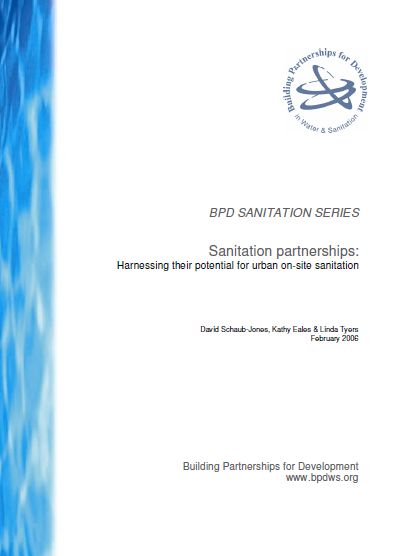Sanitation partnerships: Harnessing their potential for urban on-site sanitation
Eales, K., Schaub-Jones, D., Tyers, L. (2006)

Published in: 2006
Publisher:
Building Partnerships for Development (BPD), Water and Sanitation for the Urban Poor (WSUP), UK
Author:
Eales, K., Schaub-Jones, D., Tyers, L.
Uploaded by:
SuSanA secretariat
Partner profile:
common upload
4584 Views
35 Downloads
Content - Summary
A Sanitation Series paper focusing on four emerging themes within sanitation partnerships and presenting three roles that these partnerships have to play.
The numbers are well known – too many poor people still lack access to basic water and sanitation services in the developing world. Factors that prohibit access are numerous. Prohibitive connection charges and tariffs, high technology standards, and uncoordinated and non-inclusive decision-making all complicate the provision of sustainable water and sanitation services in poor communities.
Multi-sector partnerships between public, private, civil society and donor organisations designed around specific projects or aimed at more systemic change provide an increasingly important tool to overcome these failures. Such partnerships foster innovation and promote greater accountability by improving the understanding and capacity that make projects more appropriate and effective.
BPD Water and Sanitation is an international multi-sector learning network focused on improving access to safe water and effective sanitation in poor communities. BPD's primary aims are:
- To understand more concretely how partnerships can contribute to meeting the water and sanitation needs of poor communities;
- To provide direct support to innovative partnership approaches that aim to provide water and sanitation to the poor; and
- To disseminate findings through training activities and constructive dialogue around water and sanitation issues affecting poor communities.
Bibliographic information
Eales, K., Schaub-Jones, D., Tyers, L. (2006). Sanitation partnerships: Harnessing their potential for urban on-site sanitation. Building Partnerships for Development (BPD), Water and Sanitation for the Urban Poor (WSUP), UK
Filter tags
English














